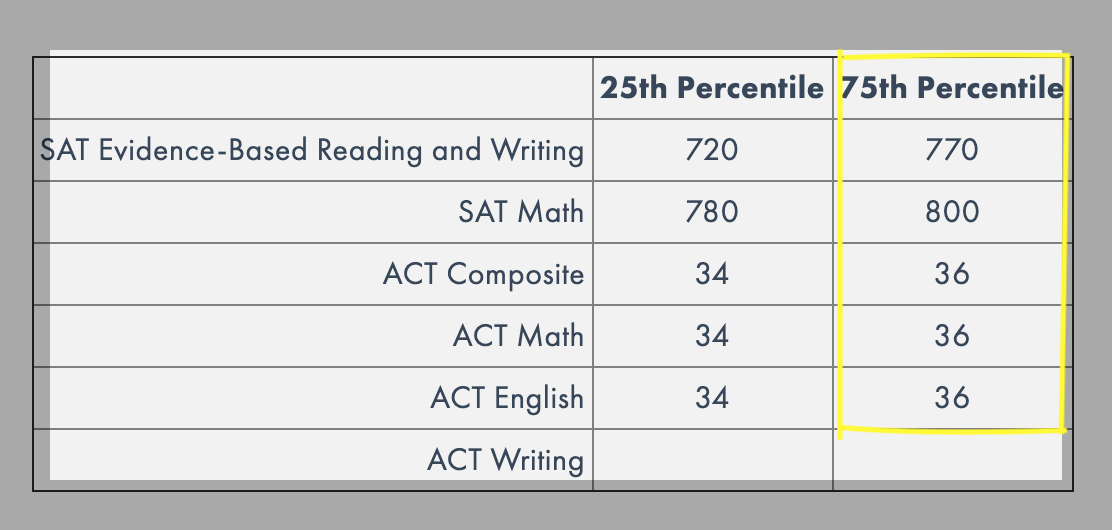What Test Optional Really Means
Updated August, 2022
Families often ask me how much standardized test scores really matter in the college admissions process, especially for colleges that say they are “Test Optional.” Many colleges have shifted to a test optional policy permanently, while others are doing so only temporarily in light of the COVID-19 pandemic. Unfortunately, what Test Optional means literally - you have the option to submit test scores or not - doesn’t really provide any guidance. I hope I can at least shed a little more light on a policy that is not completely transparent.
For those of you who may not want to read this entire post, a summary first:
Test Optional ≠ Test Blind. Most Students will want To Take The SAT Or ACT.
COVID-19 & Testing: as of this writing, all the Ivies (except Cornell), Stanford, Georgetown, et. al. still require the SATI or the ACT. Though many colleges have shifted to a Test Optional status (some if only for the class of 2021), keep reading if you want to understand what this does/doesn’t mean.
SAT Subject Tests (SAT II) No Longer Required. It is therefore likely that AP and IB exams will play a greater role in admissions.
Many students submit SAT & ACT scores, even to colleges that have been Test Optional for some time. According to Bowdoin College's Common Data Set for 2021-22 cycle, 55% of enrolled students had submitted an SAT score and 33% an ACT score. , At Wake Forest, 46% of students submitted a standardized test score.)
Testing policies do not necessarily apply to all students equally; you have to think about the a) cohort of students with whom you’re competing and b) whether other aspects of your application will make you shine if you choose not to submit test scores.
Some colleges (especially larger state systems) use test scores as cutoff points to facilitate wading through thousands of applications, and for determining merit award and honors program eligibility.
High School Grades Count More Than Test Scores, But….
High school lasts four years, so shouldn’t colleges care more about your class grades than a number from a single day of testing?
Two reasons colleges still rely on standardize test scores are because they….
allow colleges to compare students from schools across a country in which high schools vary widely when it comes to academic rigor.
provide colleges that receive more applications than they can manage, a way to create a cutoff points - which could be for general admission, admission to special programs (e.g. honors programs), or for deciding merit awards.
Brent Evans of the Stanford University Center for Education Policy Analysis explains it well: “The exam score therefore functions as a way to compare students on the same scale not only to other current applicants but to past applicants as well. It serves to identify students [who] may be underachievers in high school but have high potential for succeeding in college and students that may have received great grades in high school but not be well prepared for the additional rigors of the college curriculum.”
Read The Fine Print: Test Optional ≠ Test Blind
One admirable goal of changes to testing policies is to try and bring more equity and diversity to the admissions process, and there is evidence that test optional schools have enjoyed increases in the number of underrepresented applicants, though not so much in the number of admissions offers to underrepresented students.
Some highly-ranked colleges have been test-optional for several years, including Bowdoin, Smith, Wake Forest, and Wesleyan, among others. Other colleges such as Brandeis, Middlebury, and NYU are "test-flexible," meaning they will consider AP scores and subject tests instead of the traditional SAT or ACT. Parents and students became really excited when one of our country’s most highly selective universities, The University of Chicago, went test optional in 2018.
“If scores support their ‘academic story,’ then it’s a good idea to include them, says Whitney Soule of Bowdoin College, which has had a test-optional policy since 1969.”
But if you take a closer look at the University of Chicago’s admissions website you’ll see the following advice: “We encourage students to take standardized tests like the SAT and ACT, and to share your scores with us if you think that they are reflective of your ability and potential.” According to test prep thought leader Jed Applerouth, “the overwhelming majority of students will apply to Chicago with a very strong test score. Most likely ninety plus percent of students who receive an offer at Chicago in this current admissions cycle will have submitted a test score. We know this because of the submission rates at other prominent test-optional schools.”
In other words, the policy is test optional, but not test blind. So at these schools, especially if you come from an affluent and a well-represented background, “optional” really isn’t; you need to take the test.
Colleges’ testing requirements change frequently so you’ll want to check each school’s admissions website thoroughly. Think about what other students who may be “benchmarks” for you, based on Naviance or a College’s Common Data Set, are doing. (See more about this below.)
Do Colleges Have Test Score Minimums or Cutoffs?
Yes and No.
Most colleges and universities publish what is known as the Common Data Set which provides a whole host of information about accepted students for each incoming first-year class, including ACT and SAT test score ranges at the 25th and 75th percentiles. Since test scores are part of a bigger puzzle, colleges typically don’t have a certain SAT or ACT score a student must achieve to gain acceptance. There’s some wiggle room here as MIT’s policy makes explicit: “We do not have cut off or recommended scores for the ACT, SAT, or SAT Subject Tests as scores are evaluated within an applicant’s context.”
Sorry to be trite here, but a picture really is worth 1,000 words. As you can see in the chart below from MIT’s 2018-19 Common Data Set, to be in the 75th percentile of MIT’s 2018-19 accepted first years, you had to have at least a 1570 overall SAT or a 36 ACT score. You can also see that ALL accepted first years had a minimum math score of 780 SAT or 36 ACT.
MIT Common Data Set
A recently revealed internal document from the Harvard lawsuit tells the same story: to be a “serious contender” at Harvard students need a “mid-to-high 700s, out of a possible 800 on each part of the SAT. Or at least 33 out of a maximum 36 on the ACT.”
Since your student will typically be compared to other students in their school, you can also glean a lot of important information about the role of test scores in admissions for your high school by looking at the scattergrams in Naviance or Overgrad, or whatever your high school equivalent is.
Take a look at these scattergrams of accepted and rejected students from an affluent, suburban high school to the UNC Chapel Hill and the University of Pennsylvania respectively. Notice there are two green check marks that show lower GPAs/test scores than the for the big cluster. These lower scores, generally for recruited athletes and development candidates, bring down a college’s reported 50% range. That means that unless you are a star on your football team (or other highly recruited sport) the average GPA and test scores required for students like you could be even higher.
Standardized Tests Still Ranked A Top Admissions Criterion
As a former Yale admissions officer put it to me recently, “picture standardized test scores like the balance on a scale: great test scores can lift up weaker parts of a college application and poor test scores can weigh them down.”
The 2018 survey from the National Association for College Admission Counseling reports that test scores are one of the top factors in admissions criteria for freshmen. Only three things are considered more important, according to surveys of these counselors: grades in college prep courses which 73% rated as considerably important, grades in all courses which similarly rated 75% and the overall strength of a student’s curriculum (62%). Forty six percent of these admissions counselors said SAT/ACT scores are considerably important, with only 4% saying they don’t matter at all.
(As a comparison student personal essays are rated as considerably important only 23% of the time and recommendation letters just 15% of the time.)
Over the past ten years, how much SAT/ACT scores matter has decreased a bit from a high of 60%, whereas overall GPA has become more important. Most other factors have shrunk in influence. Things like class rank, which used to matter a lot, have dropped significantly, as has the personal interview and demonstrated interest in a school. These are general trends, though, and may not hold up for highly selective schools. All the Ivies, Stanford, Duke, and many more of the top-tier universities still require test scores.
The bottom line? Fair or not, scores matter.
Good News: Raising ACT/SAT Scores Can = Merit Awards & Honors Programs
In addition to the fact that with some practice and effort, you can almost always improve your test score, doing so may make you eligible for merit-based scholarships and/or selective honors programs within larger universities. So even if your student has good enough scores and grades to get into a given college, it can be worthwhile to push a little harder. For example, you would be in the 75th percentile for regular acceptance to University of Pittsburgh with roughly a 1330 SAT or a 28 ACT. But to be eligible for the well-regarded University of Pittsburgh’s Honors Program, you’d need a 1450-1500 SAT or a 32-33 ACT (in addition to a higher average GPA).
Improving ACT/SAT Test Scores Can Yield Big Scholarships: A Case Study
Consider the case of Savitha. When Savitha first came to me, she was set on the ACT because that was her state’s school-day state test and she had already invested a lot of time on her own working on it. She and I worked a bit more on the ACT, even though I suspected, based on our work together, that she'd be more successful with the SAT. She finally agreed to switch the fall of her senior year and we worked intensely for about two months, raising her initial SAT score from 1380 to 1460.
As a result, Savitha earned a full merit scholarship to UT Dallas plus a stipend — a big return on investment for her time — and an 8,567% return on her tutoring investment. (That's not a typo!)
Wondering how you can boost your SAT and ACT scores for scholarships and a better shot at admission to a dream school? Get in touch to find out more about tutoring that fits your specific needs.
Additional Sources:
What Gives You An Edge In Harvard Admissions? Check The Trial Evidence, Washington Post, 2018
Test Optional Admissions Won’t Level the College Admissions Playing Field, EdSource 2019.
The Coronavirus might cause more schools to go test-optional (but you should take the SAT or ACT anyway), Erica Meltzer, The Critical Reader, 2020





